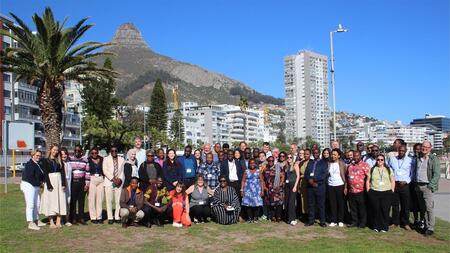Safe alternatives to toxic tuberculosis drug linezolid
Research findings from the Institute of Infectious Diseases and Tropical Medicine at LMU University Hospital Munich and consortium partners show that two novel antibiotics are better tolerated in the treatment of multidrug-resistant tuberculosis.
A group photo of "PanACEA", a successful European-African tuberculosis trials consortium that has developed trial capacity in many African countries.
Two international clinical studies led by PD Dr. Norbert Heinrich from the Institute of Infectious Diseases and Tropical Medicine at LMU University Hospital Munich and conducted with international partners have shown the safety and efficacy of two promising antibiotics as potential alternatives to linezolid in the treatment of tuberculosis. Sutezolid and delpazolid have demonstrated strong antimicrobial activity and a notably better safety profile than linezolid. These drugs have the potential to replace linezolid as the cornerstone of multidrug-resistant TB treatment. The findings were published in two articles in the renowned journal The Lancet Infectious Diseases. Research partners in Germany included the German Center for Infection Research (DZIF), the Fraunhofer Institute for Translational Medicine and Pharmacology, the Center for International Health at LMU University Hospital, and Helmholtz Munich.
In 2022, the World Health Organization introduced linezolid as part of the BPaLM regimen—which also comprises bedaquiline, pretomanid, and moxifloxacin—as the recommended standard six-month treatment for patients with multidrug-resistant tuberculosis. This reduced the treatment duration from 18 months, which was the previous standard.
The challenge with linezolid
However, linezolid is highly toxic. Prolonged exposure to linezolid—much longer than the intended use for treating bacterial skin infections—frequently leads to serious adverse events, such as anemia or diseases of the optic nerve (optic neuropathy). These events are distressing for patients and may not fully resolve, requiring discontinuation of therapy and limiting treatment success. "Despite its effectiveness, linezolid is simply too toxic for many patients. We urgently need safer alternatives within this class of antibiotics," explains DZIF researcher PD Dr. Norbert Heinrich.
New drugs with better tolerability
Like linezolid, both sutezolid and delpazolid belong to the oxazolidinone class, but they show significantly lower toxicity. In two innovative Phase IIb studies–SUDOCU (PanACEA Sutezolid Dose-finding and Combination Evaluation) and DECODE (PanACEA Delpazolid Dose-finding and Combination Development)–both drugs were tested in combination with bedaquiline, delamanid, and moxifloxacin, making them the first trials to use these specific four-drug combinations. The studies, conducted in South Africa and Tanzania, showed that in patients with drug-sensitive pulmonary TB, both drugs are safer and more tolerable for patients than linezolid would be.
Key findings show better patient outcomes
Sutezolid showed a pronounced antibacterial effect at all tested dosages and was well tolerated, with no documented cases of neuropathy or hematological toxicity. These results suggest that sutezolid could be a safe alternative for future TB therapies, especially for longer-term use. However, a final dosage recommendation is not yet possible.
Delpazolid improved the efficacy of the combination with bedaquiline, delamanid, and moxifloxacin. A once-daily dose of 1,200 mg achieved the desired drug levels for maximum efficacy and was well tolerated over a 16-week period. Again, no cases of nerve damage or hematotoxic side effects were observed.
"These findings suggest that both drugs may offer safer treatment options for TB patients, particularly those requiring longer courses of therapy," says Dr. Tina Minja, study leader of the DECODE study at the NIMR-Mbeya Medical Research Center in Tanzania. The center is one of four African Partner Institutions with which the DZIF has long-standing collaborations.
A collaborative global effort
The studies were conducted as part of the PanACEA network (Pan-African Consortium for the Evaluation of Anti-Tuberculosis Antibiotics), an international consortium in Africa and Europe. SUDOCU and DECODE are open-label, randomized Phase IIb studies in which different dosages were systematically compared in terms of antibacterial activity, drug exposure, and safety profile.
Source: Clinical Trials Reveal Promising Alternatives to Highly Toxic Tuberculosis Drug
More links:
https://www.lmu-klinikum.de/tropeninstitut
https://panacea-tb.net




